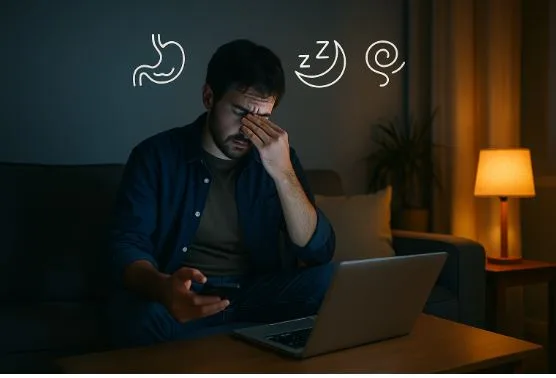Why Stress, Sleeplessness, and Gut Problems Are Spiking Nationwide and Why Ancient Wellness Habits Are Back in the Spotlight
Across the United States, more people are reporting trouble sleeping, chronic stress, poor digestion, and a general sense of being overwhelmed. Health surveys and workplace reports point to the same trend. Americans feel more burned out than ever, even as the country moves farther away from the shutdown years of the pandemic.
Doctors say the rise is not surprising. Schedules are tighter, screens dominate more of the day, and the pace of information has outgrown the average person’s ability to process it. The result shows up in physical symptoms long before people notice the pattern. People describe disrupted sleep, bloating, heartburn, anxiety, and morning fatigue that does not go away with coffee.
As modern solutions fall short, something interesting is happening. Americans are turning toward very old ideas to make sense of their symptoms. Search trends show that interest in Ayurveda, the traditional wellness system of India, has climbed steadily in the past two years. It is not a medical treatment in the Western sense, but it offers a framework that many say feels more intuitive than calorie counting or generic fitness plans.
At first glance, Ayurveda appears simple. It teaches that digestion, sleep, and mood all come from the body’s daily rhythm. When that rhythm becomes irregular, the body starts sending warning signs long before disease appears. What is striking is how closely this matches what many Americans describe today. Meals are rushed or delayed, work blends into family time, people sleep late, and the mind never fully shuts off.
Dr. Amit Gupta, a physician who also teaches Ayurveda wellness, says the rise in stress-related symptoms lines up with what the system predicts. “Ayurveda looks at the body as an interconnected network,” he explains. “If digestion weakens because of stress or irregular habits, everything downstream suffers. Energy drops, mental focus fades, inflammation rises, and people feel unbalanced.”
Unlike many wellness trends, Ayurveda focuses less on products and more on routine. It emphasizes that small daily habits have a larger impact on health than occasional big changes. Warm meals, consistent sleep schedules, slow breathing after work, and paying attention to hunger cues are considered foundational practices. They are not dramatic, but they work because they calm the system rather than stimulate it.
People experimenting with these habits report early improvements in sleep, bloating, and morning energy. Many say the biggest benefit is the structure. After years of disrupted routines, a predictable rhythm feels therapeutic.
Another reason the approach is gaining attention is that it offers explanations that feel human. For example, Ayurveda teaches that constant rushing and mental overload weaken digestion. In Western terms, this mirrors research showing that stress hormones interfere with the gut and raise inflammation. The language is different, but the observation overlaps.
Communities across the country are noticing similar patterns. In cities, residents talk about irregular eating, rising anxiety, and short sleep. In suburban and rural regions, people describe burnout and low resilience. The complaints are surprisingly similar, even though the lifestyles differ. Journalists and researchers say this consistency is part of why older wellness systems are receiving new attention.
For many people, the appeal lies in the accessibility. Warm foods, early bedtimes, simple breathing practices, and mindful eating cost nothing. They do not require labs or equipment. Yet they have measurable effects on mood and digestion.
This growing curiosity has led to new educational platforms designed to help people learn Ayurveda in a modern, structured way. One example is CureNatural, a wellness education company that offers online courses and a new mobile app that personalizes daily routines based on a person’s body type. It does not diagnose medical conditions. Instead, it teaches users how to apply simple methods that support digestion and help manage internal stress.
Dr. Gupta believes the interest will continue to rise. “Ayurveda resonates because it explains why people feel the way they do,” he says. “It gives them daily habits they can follow and understand.”
As Americans continue searching for steadiness in a fast-moving world, these older ideas are finding new relevance. The problems may be modern, but the solutions might be timeless.





